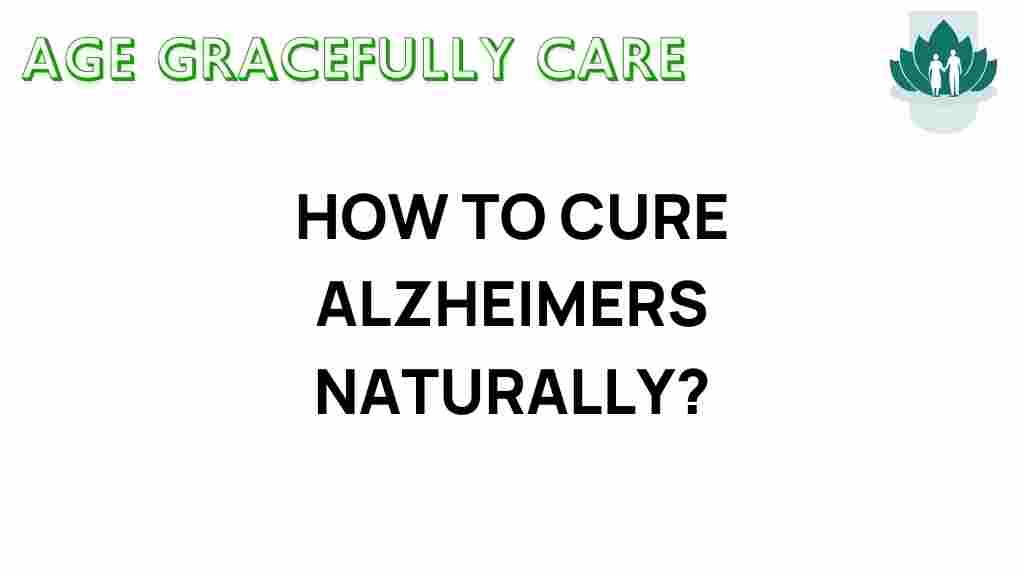Unlocking Nature’s Secrets: How to Cure Alzheimer’s Naturally?
Alzheimer’s disease is a complex and challenging condition that affects millions of individuals worldwide. As we strive for better brain health, many are exploring natural remedies and holistic health approaches to support memory and cognitive function. In this article, we will delve into various lifestyle changes, herbal treatments, and wellness strategies that may help in managing Alzheimer’s symptoms and enhancing brain health.
Understanding Alzheimer’s Disease
Alzheimer’s is a progressive neurological disorder that leads to memory loss, cognitive decline, and changes in behavior. While there is currently no cure, many individuals seek natural alternatives to support their brain health. This guide will explore several natural remedies that focus on enhancing cognitive function and overall wellness.
How Natural Remedies Can Help Alzheimer’s
Natural remedies for Alzheimer’s emphasize a holistic approach to health. These remedies may not cure the disease, but they can help improve quality of life, support memory, and enhance cognitive function. Here are some strategies to consider:
1. Embrace a Brain-Healthy Diet
A well-balanced diet is essential for maintaining brain health. Consider incorporating the following elements into your daily meals:
- Omega-3 Fatty Acids: Found in fish, walnuts, and flaxseeds, these healthy fats support cognitive function.
- Antioxidant-Rich Foods: Berries, dark chocolate, and leafy greens help combat oxidative stress.
- Whole Grains: Foods like oats and quinoa provide sustained energy for brain function.
- Healthy Fats: Olive oil and avocados are beneficial for overall brain health.
The Mediterranean Diet
The Mediterranean diet has been linked to reduced risk of Alzheimer’s. This diet focuses on whole foods, healthy fats, and plenty of fruits and vegetables. Adopting this style of eating can not only enhance memory support but also promote overall wellness.
2. Engage in Regular Physical Activity
Exercise is a powerful tool for boosting brain health. Engaging in regular physical activity can help:
- Improve blood flow to the brain.
- Enhance cognitive function and memory.
- Reduce anxiety and depression levels.
Consider activities such as:
- Walking: A simple yet effective way to stay active.
- Yoga: Promotes relaxation and mental clarity.
- Strength Training: Builds muscle and supports brain function.
3. Prioritize Mental Stimulation
Keeping the brain engaged is crucial for memory support. Activities that challenge the mind can help:
- Enhance cognitive function.
- Delay the onset of symptoms.
Try incorporating these activities into your routine:
- Puzzles: Crosswords and Sudoku can keep the mind sharp.
- Learning a New Skill: Consider taking up a new hobby or language.
- Reading: Regular reading stimulates brain activity.
4. Herbal Treatments for Alzheimer’s
Herbal treatments can play a supportive role in managing symptoms of Alzheimer’s. Here are some promising options:
- Ginkgo Biloba: Known for its potential to improve memory and cognitive function.
- Turmeric: Contains curcumin, which has anti-inflammatory properties that may benefit brain health.
- Rosemary: Traditionally used to enhance memory and concentration.
Always consult with a healthcare professional before starting any new herbal regimen.
5. Implement Stress Reduction Techniques
Chronic stress can negatively impact cognitive function. Implementing stress reduction strategies can enhance overall wellness and memory support. Consider the following methods to manage stress:
- Meditation: A daily practice that cultivates mindfulness and reduces anxiety.
- Deep Breathing Exercises: Helps to calm the mind and relax the body.
- Spending Time in Nature: Nature walks can improve mood and reduce stress levels.
6. Establish Healthy Sleep Patterns
Quality sleep is vital for brain health. Poor sleep can exacerbate symptoms of Alzheimer’s and impair cognitive function. To improve sleep quality:
- Establish a regular sleep schedule.
- Create a calming bedtime routine.
- Avoid screens before bedtime.
Common Sleep Disorders
If sleep issues persist, it may be beneficial to consult a healthcare professional to rule out sleep disorders such as sleep apnea.
7. Stay Socially Active
Maintaining strong social connections is essential for cognitive health. Engaging with others can provide emotional support and mental stimulation. Strategies to remain socially active include:
- Joining clubs or groups.
- Volunteering in the community.
- Regularly connecting with family and friends.
8. Consider Supplements
Some supplements have shown promise in supporting brain health. However, it is essential to consult with a healthcare provider before introducing any supplements into your routine. Consider the following options:
- Omega-3 Fatty Acids: These supplements can provide additional brain support.
- Vitamin E: May help protect brain cells from damage.
- B Vitamins: Important for energy production and cognitive function.
9. Troubleshooting Tips for Lifestyle Changes
Making lifestyle changes can be challenging. Here are some troubleshooting tips to help you stay on track:
- Set Realistic Goals: Start with small, achievable changes and gradually build on them.
- Track Your Progress: Keep a journal or use apps to monitor your activities and improvements.
- Find Support: Engage with friends, family, or support groups to stay motivated.
10. Seek Professional Guidance
While natural remedies can provide support, working with healthcare professionals is crucial. They can offer personalized advice and monitor progress. This can include:
- Consulting with a nutritionist for dietary advice.
- Working with a therapist for mental stimulation strategies.
- Engaging with a doctor to discuss any potential supplements.
Conclusion: Embracing a Holistic Approach to Alzheimer’s
While there is no definitive cure for Alzheimer’s, adopting a holistic health approach can significantly improve quality of life. By integrating natural remedies, lifestyle changes, and wellness strategies, individuals can support their brain health and potentially enhance cognitive function. Remember, it’s essential to consult with healthcare professionals before making significant changes to your health regimen.
For more information on holistic health and wellness strategies, check out our comprehensive guide.
To learn more about Alzheimer’s and related resources, visit the Alzheimer’s Association’s website here.
This article is in the category Health and created by AgeGracefullyCare Team
